The surface layer of the epidermis is constantly renewed: the stratum corneum is rejected and replaced by keratinocytes - new cells. Due to unfavorable environmental conditions: climate, allergies, fungal infection, interaction with toxic substances, lack of moisture, nutrients and vitamins, hereditary predisposition, the stratum corneum begins to be rejected intensively, while the formation of keratinocytes is also activated. As a result, peeling appears on the face - what to do and how to restore health and beauty to the skin becomes a particularly significant problem.
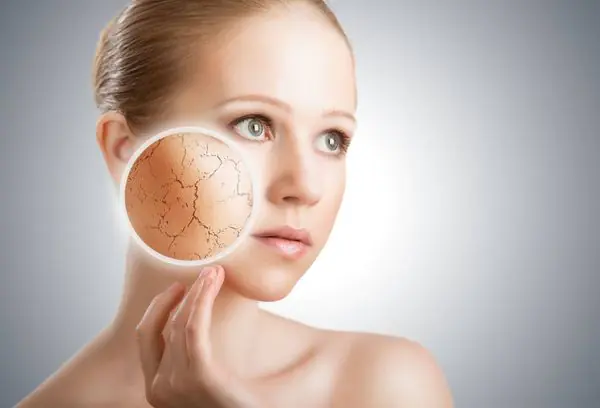
Causes of peeling skin
Sudden peeling on the face is a reason to think about it. This may be due to improper skin care or problems within the body.
- Lack of moisture. In 97% of cases, the skin begins to peel due to dehydration. Signs of a lack of fluid in the body also include thirst, dizziness, dry mouth, weakness, low blood pressure, nausea, and palpitations. Typically, such symptoms are caused by insufficient drinking, intense sweating, and the use of diuretic medications.
- Incorrect care. Peeling of the skin on the face, caused by improper care, most often occurs in people with sensitive skin types, which are characterized by an acute reaction to any external intervention.
- Incorrectly selected or low-quality cosmetics. Another reason why the skin on the face begins to peel off. This is more often observed in women, since it is the weaker sex who tend to get carried away with cosmetics.
- Unfavorable environment. These include temperature changes, exposure to direct sunlight on the skin, wind, and very dry air in office premises (especially in winter). In this case, the skin on the face peels off chronically, due to prolonged contact with the irritant, and in addition, dryness is observed. There may be mild redness, swelling, mild itching and burning, soreness, cracks, and thickening of the skin. Urticaria, rhinitis, asthma attacks, and conjunctivitis are not observed.
- Allergy. Redness and peeling can be caused by animal hair, pollen from flowering plants, and some medications. Problems with the skin stop if the irritant is removed.
- Diathesis. It develops as an allergic reaction, although experts do not consider it an allergy. Signs of diathesis can vary greatly, but in most cases there is dryness and swelling, the skin turns red, itches, and flakes. Particular discomfort is felt at night. Sometimes vesicles and papules appear on the face. Diathesis can be contact (for example, with the local use of inappropriate or low-quality cosmetics, ointments) and atopic, which is a manifestation of an allergy to something (wool, pollen, some products).
- Avitaminosis. Peeling on the face may be due to insufficient intake of vitamins and minerals from food. As a rule, a lack of vitamins A and group B affects the condition of the skin in a similar way.
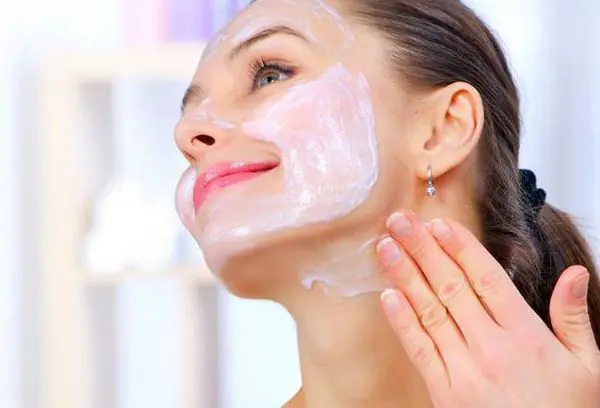
Insufficient consumption of keratin (vitamin A) is also manifested by night blindness, inflammation of the cornea and eye mucosa, bronchitis, urethritis and inflammatory processes in the intestinal mucosa.
With a lack of vitamin B2, the mucous membranes of the eyes, the skin between the nose and upper lip, and on the eyelids become inflamed, ulcers appear in the corners of the mouth, cracks on the lips, muscle weakness, and anemia.
Vitamin B3 deficiency is manifested by general weakness, diarrhea, paralysis, in addition, hair loss, tongue inflammation, hallucinations, delirium, and insomnia are possible.
A lack of vitamin B6 is characterized by the development of fungal inflammations on the skin, anemia, insomnia, irritability, weakness and inflammatory processes on the mucous membranes.
Drowsiness, malaise, muscle pain, depression, increased fatigue and decreased blood pressure are characteristic signs of vitamin B7 deficiency.
Peeling of facial skin can also be associated with certain diseases:
- Ichthyosis. Signs of the disease are very dry, rough and rough skin due to a significant increase in the number of horn cells. Most often, due to ichthyosis, the skin on the face peels off in young children (1-4 years) and adolescents.
- Seborrheic dermatitis. The disease manifests itself in the form of itching, redness and flaking of the skin, affecting exclusively areas with a large number of sebaceous glands and hair. Develops as a result of decreased immunity, heavy sweating, stress, poor hygiene, alcohol consumption, and an unbalanced diet.
- Psoriasis. Red-pink spots with psoriasis flake and itch, rarely appear on the face (they can be seen on the forehead, temples, neck), more often they are localized on the body. Psoriasis is characterized by periods of remission and exacerbation. The disease is provoked by drinking alcohol, hypothermia, prolonged exposure to sunlight, stress, and taking medications.
In what cases is it necessary to consult a doctor?
If the skin on your face is peeling, this is not always a consequence of dehydration and a harmless lack of vitamins. In some cases, such skin problems indicate diseases that may worsen over time.
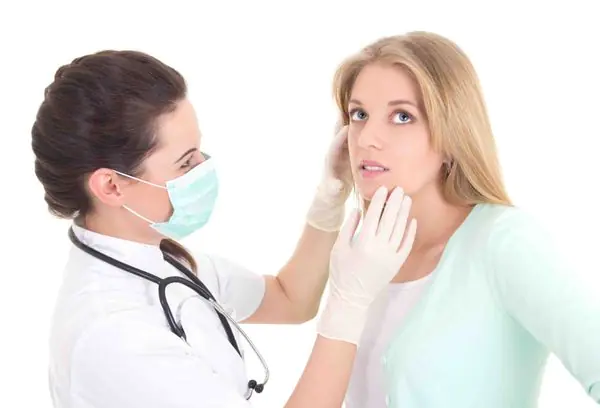
Signs that you need to see a doctor:
- dry, flaky skin that itches a lot and has a burning sensation;
- erosions, spots, ulcers, ulcers, cracks appeared on the face;
- peeling is accompanied by dizziness, diarrhea, joint pain, headache, hallucinations, insomnia, paralysis;
- flaky spots differ from the rest of the skin in color;
- the skin is bright red and swollen;
- the skin peels in the nasolabial folds, on the eyebrows, around the eyelashes, on the head.
How to get rid of peeling
Peeling skin on the face can be treated, and creams containing no more than 0.5% hydrocortisone will be especially effective. Apply the product once a day to problem areas for 14 days. It is prohibited to use such creams for a longer period of time, since these are not ordinary cosmetics, but medicine.
What to do if the peeling is very strong and ordinary moisturizing creams cannot cope with it? In this case, the use of drugs that contain dexapanthenol is effective. These are, for example, “Panthenol” in the form of a cream or spray, prescribed by doctors for burns, “Bepanten” (can be used as a means of preventing peeling in winter).
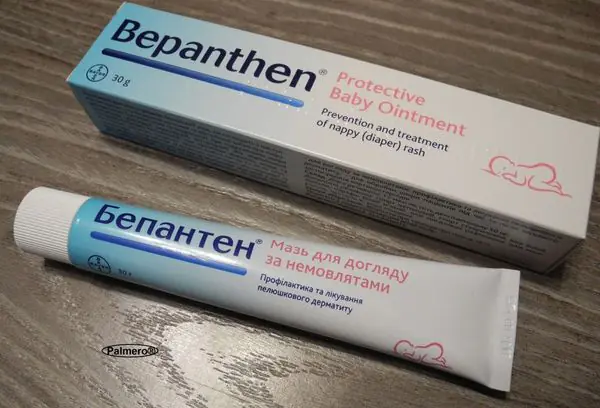
If peeling and irritation on the skin is not caused by an illness, then dealing with them on your own will not be difficult. You need to act according to the following scheme:
- remove dead cells from the surface using a scrub (it should be soft, without abrasive particles that can injure the skin);
Advice
You can make an excellent scrub with your own hands. Pour boiling water over oatmeal and leave for 20 minutes, add egg white and apply to face. Massage for 2-3 minutes, then rinse. You can use coffee grounds, fresh apple and cucumber slices, and watermelon pulp as a scrub.
- make a nourishing mask, it can be purchased or made from products that are always on hand (sour cream, cottage cheese, egg yolks, cream, boiled potatoes fight peeling);
- leave the mask on for 20 minutes, then rinse with water;
- Lubricate your skin with moisturizer.
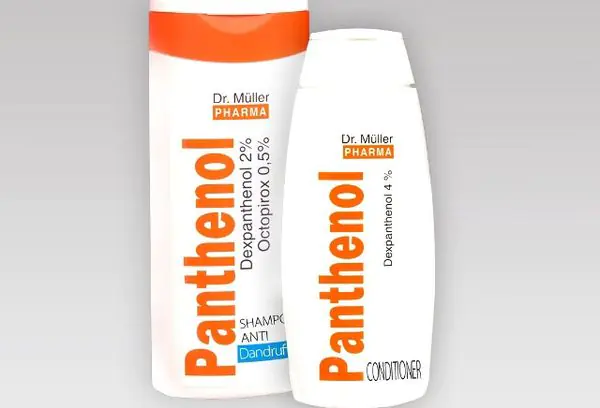
Anti-flaking masks
In winter, masks are a must. Particularly useful are compositions with yolk, vitamins, cottage cheese, cream:
- mix 0.5 tablespoon of honey with 2 yolks and 0.5 tablespoon of vegetable oil, spread on the face every 5 minutes (no need to wash off the previous layer), leave for 20 minutes and rinse with a cotton pad soaked in a decoction of linden flowers;
- lightly heat vegetable oil (olive, wheat germ, almond or flaxseed) and lubricate your face with it, after 30 minutes rinse with warm water;
- mix the egg yolk with 1 teaspoon of chopped oatmeal and 1 tbsp. spoon of vegetable oil, apply to face and rinse after 15 minutes with warm water;
- Take cottage cheese, cream, milk and sour cream in equal parts, mix and apply to your face, after 15 minutes wash with warm water.
A balanced diet will help you overcome peeling and irritation on the skin. The table must have fresh vegetables and fruits, seafood, fish, dairy products, and nuts. In autumn, winter and spring, it is advisable to take special vitamin and mineral complexes.
Irritation appeared on the face, the skin on the face began to peel and itch - what are the reasons. Treatments and tips to prevent itching and blemishes on the face.
If the skin on your face itches and peels, then to eliminate the unpleasant symptoms you should find out the causes of this phenomenon. Many diseases can provoke the appearance of these signs (from ordinary dermatitis to serious dysfunctions of internal organs and systems), as well as poor nutrition. In addition, improper facial skin care can cause discomfort.
Causes of itching
There are exogenous and endogenous factors for the occurrence of itching and dryness of facial skin. Sometimes this is due to a reaction to inappropriate or low-quality cosmetics and care products. In this case, the problem can be solved simply by changing the products to new ones. In some cases, flaking and itching are caused by excessive dry skin.
To reliably find out why your face itches and peels, you should immediately visit a dermatologist. The following factors may contribute to the problem:
- Improper skin care. Excessive use of peeling and exfoliants, alkaline detergents, including plain soap. If a new cosmetic product causes itching or dryness, it is better not to use it further.
- Allergic reactions. Most often they are caused by food. The leaders among them are exotic fruits, nuts and seafood. There may also be other causes of allergies, for example, the materials from which the bedding is made, as well as washing powder, fragrances and dyes. Itching and flaking of the skin on the face can be caused by an individual reaction to pharmacological drugs. If your face begins to itch after taking medications, you should consult your doctor.
- Skin reaction to adverse natural influences. If skin problems appear only in the cold season, then it is possible that flaking and itching are provoked by windy and frosty weather. This reaction to cold is typical for people with anemia and thyroid disease.
- Internal diseases. Dryness, itching and flaking can be caused by factors such as infectious and parasitic diseases, as well as diabetes and oncological pathologies.
If you cannot determine the causes of peeling and itching, and also eliminate them yourself, then it is better to visit a dermatologist. He will order an examination and, if necessary, involve other specialists.
To obtain the necessary therapeutic effect and to avoid relapses, you should strictly follow the dermatologist’s recommendations and properly treat your face with recommended products.
Seborrheic dermatitis
This pathological condition is caused by decreased activity of the glands or the chemical composition of the sebaceous secretion. Seborrhea is more common in male patients with impaired immunity or endocrine disorders. The disease has the following symptoms: a pink spot appears on the face with bloody crusts, itching and peeling occur, and the pores expand.
The nature of treatment depends on the functioning of the sebaceous glands and the severity of the pathology. In severe cases of the disease, corticosteroids, antibacterial ointments and alcohol solutions are indicated. Mild seborrhea does not require systemic treatment. As a rule, local administration of antimycotic agents (with zinc, tar or ketoconazole in the composition) is sufficient.
Facial psoriasis
This is a rare condition affecting the face. It starts with small local spots. Papules then form. The affected areas grow, become covered with scales, itch and peel. Most often they are localized in the nasolabial triangle and eyebrow area. Sometimes the lips and eyelids are involved.
The seborrheic type of psoriasis is located along the hairline on the forehead, behind the ears, on the forehead, forming yellowish crusts. For treatment, systemic exposure (Cyclosporine, Roaccutane), local therapy (Diprosalic, Calcipotriol, sulfur-tar and salicylic ointment), and irradiation are used.
Treatment of demodicosis
This disease is caused by microscopic skin mites that live in hair follicles and sebaceous ducts. Demodicosis is an opportunistic pathogen that normally lives on the skin of any healthy person, but when the immune defense is weakened, it can cause skin inflammation, acne and unbearable itching.
Treatment includes the following drugs:
- immunostimulants;
- antiparasitic agents (Metronidazole, Trichopolum);
- antibacterial ointments (Permethrin, Aversect);
- Dexodem Phyto gel.
Demodicosis usually worsens in the off-season. The mite is especially active in the evening, causing unbearable itching in the patient.
Facial rosacea
The causes of the disease have not been fully studied, but the role of gastrointestinal diseases, pathologies of the endocrine and nervous systems, as well as hereditary predisposition has been noted. The skin of the face is inflamed, hyperemic, begins to itch very much, and tubercles and vascular networks appear on it.
Treatment methods are aimed at treating primary diseases and reducing symptoms:
- diet therapy,
- psychotherapy,
- antibacterial drugs (topically and orally),
- immunostimulants,
- cryotherapy.
Proper facial skin care and protection from the damaging effects of weather conditions (severe frost, wind, rain) are of great importance. In the summer, before going out, it is necessary to apply sunscreen with SPF of at least 15, and also shade your face with a wide-brimmed hat. Visiting the solarium, bathhouse and sauna is contraindicated.
Universal recommendations
To choose the right drug against peeling and itching of facial skin, you should know the pharmacological effect of its components, take into account contraindications and possible side effects. To enhance the therapeutic effect, the product should be applied to clean skin immediately after the bath. In many cases, spa treatment and improving the body’s immune status are effective. The main condition for successful therapy is a complex effect that provides a full range of therapeutic measures.
To avoid discomfort, you must adhere to the following rules:
- Monitor the quality and expiration date of cosmetics and hygiene products. Use small intervals if products from the same manufacturer are constantly used.
- Do not overuse alcohol-containing or alkaline products that dry out the skin greatly, as they can cause itching and cracking of the skin.
- Avoid allergenic foods, especially citrus fruits, nuts and seafood. But at the same time, nutrition should be varied and balanced according to the BZHU.
- In the summer heat, you need to moisturize your skin and remember to drink enough fluids. Use sunscreen. In winter, protect your face with a scarf or high collar, and use rich creams.
- Avoid steam rooms and saunas, which dry out the skin excessively.
If peeling and itching are not caused by more serious causes, then if these recommendations are followed, problems with the skin of the face will not arise. In some cases, the use of herbal remedies may be helpful for inflamed skin.
Getting rid of itching with folk remedies
There are many natural products that can quickly and effectively remove flaking and itching. You can soothe itchy and flaky skin with aloe juice or sea buckthorn oil.
Herbal decoction (0.30–0.200) is also effective. In order to make a lotion, you need to brew the herb with boiling water and leave for half an hour. Chamomile, nettle, string, parsley, coltsfoot or yarrow are suitable. Apply a bandage soaked in the broth to a clean face and leave for 0.5 hours.
You can also make a mask from unsalted mashed potatoes. To do this, you need to mix the puree with fatty sour cream 1:2 and make compresses. If there is discomfort, it is useful to apply a paste of fresh cucumber or cabbage to the itchy area. You can also quickly relieve itching if you apply cabbage, boiled in milk and chopped in a blender, to the inflamed skin. The puree should still be warm, but not hot.
If herbal remedies do not help get rid of unpleasant symptoms, then you should consult a dermatologist. He will prescribe an examination that will accurately indicate the causes of discomfort and help overcome peeling and itching as soon as possible. To avoid relapse of the disease, you should follow all recommendations and be sure to complete the course of treatment.
If you have itchy skin on your face and don’t know what to do about it, listen to our useful tips and recommendations. You will learn the possible causes of such a scourge, how you can get rid of them, and also learn about medications and folk remedies used in this case.
Human epidermis - a litmus test that reacts to literally everything and reflects any processes occurring in the body. If the skin on your face itches, you need to immediately find out what triggered the appearance of this unpleasant itching and take immediate measures to eliminate it.
Otherwise, this can lead to complications and consequences such as swelling, flaky crusts and even purulent ulcers. As a rule, all this is accompanied by rashes that interfere with sleep and living peacefully, because they itch constantly and painfully. The result is a lot of complexes, a reluctance to leave the house anywhere, and one single question: what to do? We will try to answer it fully and in detail.
Itchy face: reasons
As already mentioned, the skin reacts to literally everything: what we breathe, what we consume, what emotions we experience, what diseases we suffer from. The more deviations from the norm, the worse the condition of the epidermis. First of all, the skin of the face suffers, which begins to itch and itch unbearably. Sometimes for unknown reasons.
Once you feel itching, there is no need to console yourself that it will soon go away. The very next day you risk waking up with scabs and weeping sores on your face if you don’t take any measures.
The first step on the path to recovery should be to find out the reasons why your face itches. These may be the following factors:
- Allergy for food (most often citrus fruits or dairy products) or low-quality decorative cosmetics.
- The next reason why the face peels and itches is dry skin. It can be either natural or acquired. In the latter case, this happens if you often use products containing alcohol or soap with a fat-dissolving effect. On the one hand, an oily film is a very unpleasant sensation, but because of it, it is very unwise to deprive the epidermis of natural protection. An infection penetrates through cracks in the skin, and then severe itching begins.
- The face may begin to itch due to skin reactions to atmospheric phenomena. For example, to excessive heat or high humidity. If you often visit saunas and baths, don't be surprised if your face itches. For some, itching is a reaction to cold winds and frost in winter. This is called cold allergy, which usually affects those who suffer from anemia or hypothyroidism.
- Medications can also cause your face to itch. If they contain components that the body does not accept, or you have to drink them for too long and uncontrollably, the skin may react to all this with itching and a rash on the face.
- Ultraviolet irradiation may well be the explanation for why your face itches. If you overexposed yourself to the sun or got carried away with visiting a solarium, you will have to pay for it with itchy skin.
- The most unpleasant reason for this phenomenon is skin diseases, which will require mandatory drug treatment. Among them are seborrhea, psoriasis, demodicosis and rosacea.
- Internal diseases can also cause an itchy face: all kinds of infections (measles, folliculitis, chickenpox), scabies mites, diabetes, anemia, cancer.
- Bad habits: smoking and alcoholism.
- Poor nutrition: a lot of fatty, smoked, pickled and salty foods in the diet.
- Poor state of the nervous system: constant stress, nervousness, anxiety.
So, analyze the lifestyle you lead and try to understand the reasons why your facial skin itches: by eliminating the factor that causes itching, you can get rid of the scourge itself. Please note that there may be several such reasons.
Therefore, if you suspect one thing, you should not discount other points. If you were unable to do this on your own, you have only one, but very reliable way out - to seek help from a specialist. And this should not even be a cosmetologist, but a dermatologist.
Treatment of itchy skin on the face
After examination and additional tests, the dermatologist will make a diagnosis and prescribe the appropriate facial skin treatment. Depending on why your face itches, you will be prescribed medications and medical and cosmetic procedures. Be sure to go through them completely and strictly follow the doctors’ instructions so that the itchy skin does not return to you halfway.
Seborrhea
- Symptoms: the skin on the face itches, shines, flakes, pink spots appear, which soon become covered with blood crusts, and the pores expand.
- Treatment: sodium thiosulfate, calcium chloride, corticosteroids, antibacterial ointments and creams (bicarbonate, sulfur solution), alcohol solutions (salicylic alcohol, boric acid, tinctures of hawthorn or lily of the valley).
Psoriasis
- Symptoms: the skin on the face itches, turns red and becomes covered with peeling scales.
- Treatment: local therapy (salicylic, sulfur-tar, naphthalan ointments, calcipotriol, diprosalik), phototherapy, systemic therapy (acitretin, roaccutane, cyclosporine, homeopathic remedies).
Demodicosis
- Symptoms: unbearable itching, loss of eyelashes, acne.
- Treatment: drugs to strengthen the immune system; means for normalizing the functioning of the gastrointestinal tract; antiparasitic drugs (trichopolum, metronidazole, tinidazole); sulfuric, yellow mercury, ichthyol ointments; various pharmaceutical talkers; antibacterial ointments “Aversect”, “Permethrin”; anti-inflammatory cream-gel "Dexodem Phyto".
Rosacea
- Symptoms: the skin of the face becomes lumpy, inflamed, begins to itch very much, turns red, and a vascular network appears.
- Treatment: metronidazole (ointment and tablets), diet, boric acid lotions, special massage, antibiotic therapy, psychocorrection, immunocorrective drugs, cryotherapy (cold treatment).
Universal medications against itching on the face:
- antihistamines for oral use: suprastin, cetrin, fenkarol;
- topical ointments: menthol, for example;
- powders with talc;
- a compress of gauze soaked in boric acid (dilute 15 ml of acid in half a liter of water).
After treatment, try not to make any more mistakes that lead to such trouble.
To prevent your facial skin from itching, you need to eliminate from your life factors that can provoke this unbearable and unpleasant itching.
Therefore, always remember some rules that will help keep your skin beautiful and healthy.
To prevent your face from itching: tips and tricks
Many people know that unpleasant, painful feeling when the skin on the face peels and itches: on such days there is no desire to go anywhere, the mood deteriorates and you don’t want to look in the mirror at all. To never feel this way, try to follow a few simple rules. This is much more pleasant than having to spend weeks being treated for a nasty itch and hiding from everyone at home.
- Avoid dairy products and citrus fruits, to which the skin of the face often reacts with an allergic reaction. Its first sign is itchy skin. Remember: everything is good in moderation.
- Always make sure that your decorative and skincare cosmetics are of high quality and fresh. If you regularly use products from one manufacturer, do not forget to take a break every 5-6 months. Very often, the face itches precisely because of the incorrect selection of cosmetics for a particular skin type.
- Do not use alcohol-containing cosmetics to cleanse your skin too often., which lead to cracking of the skin and its excessive dryness. Also, you should not choose soap with a fat-dissolving effect for washing, which completely deprives the face of a protective film, which can also lead to itchy skin.
- Limit yourself from visiting saunas and baths. Do this at least once a week, but once a month, otherwise the skin will constantly react with itching to the dryness and steam of these establishments.
- In summer, constantly moisturize your skinso that she doesn't itch. To do this, make masks regularly and drink clean water in unlimited quantities.
- If your facial skin begins to itch and peel in winter, check whether you are adequately protecting it from winds, frosts and low temperatures. You may need to dress warmer and constantly cover your face with a warm scarf or high collar.
- Do not take any medications without a doctor's prescription. Follow the dosage and know: you cannot take medications for more than 2 weeks: side effects are inevitable, and one of them is itchy skin on the face.
- Be careful not to burn your face in the sun or in a tanning bed..
- Get a medical examination check for skin diseases that may cause your face to itch, and then get treatment.
- You will have to get rid of bad habits: quit smoking and drink less alcoholic beverages.
- Take a course of multivitamins twice a year.
- Try to eat healthy: eat more fruits, vegetables, drink natural juices.
- Breathe more fresh air.
- Try to protect your nervous system from shocks and stress of any kind.
If you follow these simple recommendations, you will not have any problems with your facial skin, especially itching and scratching. Those who have at least once experienced these unpleasant feelings know from their own experience how long all these peelings, dryness, ulcers and crusts that form as a result of this scourge take to heal.
So it is much easier to prevent itchy skin on the face than to undergo treatment and take medications later.
And, of course, you can use folk remedies that will soothe irritated skin, relieve itching and prevent its spread.
Folk remedies against itchy skin on the face
When the skin on your face itches, turns red and flakes, and there is no way to see a doctor, you can try to relieve the first painful signs with the help of folk remedies. However, be extremely careful when using them at home.
Firstly, they can also cause an allergic reaction and thereby only worsen the skin condition. Secondly, it is still better to first consult with your treating dermatologist in order to avoid complications and side effects.
Apple vinegar
Wipe itchy facial skin with apple cider vinegar once a day.
Baking soda
Apply a paste of baking soda and water (the proportions are arbitrary) to the inflamed, itchy areas twice a day.
Oatmeal mask
Grind oatmeal in a coffee grinder to flour, pour 1 tablespoon of 50 ml of cold boiled water, leave to swell for half an hour. Apply the resulting paste to problem areas of the face that itch for 15-20 minutes. It is recommended to make this mask after 1 day.
Herbal infusion compress
Pour 2 tablespoons of dried herbs (chamomile, string, nettle, parsley, oak bark, yarrow, coltsfoot) into 1 glass of boiled hot water, let it brew for half an hour. This compress should be used every day.
conclusions
Now you know what to do if the skin on your face itches: find out the causes if possible, eliminate them, consult a doctor and undergo a course of treatment, using folk remedies in parallel. This is the course of action that should be taken if such trouble overtakes you.
You don’t need unnecessary complexes about your appearance, so try to get rid of this scourge as soon as possible so that nothing interferes with your lively communication with other people and the joy of life.



